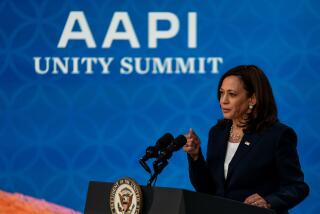A Voice for Convergence, Not Conflict
I don’t wish to repeat the idiocy of Sen. Sam Brownback, Republican from Kansas, but during the Senate hearing on Asian campaign giving last week, he let loose with a side-of-the-mouth crack based on a dim-bulb sense of how Asians generally talk. It was most unfunny, but it did serve the unintended purpose of reinforcing the impression that in the recesses of Occidental minds, Asians get no respect. Oh, sure, Brownback apologized, but I’ll bet you there weren’t three people in Asia or in our Asian American communities here who didn’t think that something ugly like this was bound to surface during these hearings.
Such historical Western condescension, whether as would-be joke or official Washington-to-Asia lectures, is a gift from the heavens to the grandstanding Asian politician. It also helps elevate more learned, albeit severe, critics of the West, such as Singapore’s Lee Kuan Yew and Malaysia’s Mahathir Mohamad, who feel the need to keep the West on the psychological defensive with critiques of our undeniable materialism and alleged cultural superficiality. Such critiques--attacks, really--are necessary, they believe, if Asia itself is not to be steamrollered by Western economic and cultural imperialism. But lately Asia has been gaining the self-confidence to articulate its views in less confrontational terms.
Undoubtedly the best example of the new, more nuanced, less defensive Asian voice comes from Mahathir’s own Malaysia. The government’s prominent No. 2, Deputy Prime Minister Anwar Ibrahim, who has his own power base and following, has been arguing for a convergence of East and West. As spelled out in his book, “The Asian Renaissance,” he offers a powerful alternative vision to that of ethnocentrists, provincials and jingoists on both sides of the Pacific Ocean who seem to take comfort in the idea of West never meeting East. While this important work was published in English by Times Books International in Asia, it is regrettably not, at present, scheduled for publication here.
Anwar is not a shouter, but a reasoner and a listener who decries extremists from both East and West. He lambastes the Asia that sees little more in America than cultural decay and moral relativism, and he rebukes Westerners who look down their noses at Asia. But Anwar is especially critical of Asian politicians who hide behind so-called Asian values (group conformity, respect for authority) to justify intellectual or political repression. “If the term ‘Asian values’ is not to ring hollow, Asians must be prepared to champion ideals which are universal,” he writes in an excerpt from his book in the coming issue of New Perspectives Quarterly, the small but influential Los Angeles-based magazine of international ideas. “It is altogether shameful, if ingenious, to cite Asian values as an excuse for autocratic practices and the denial of basic rights and civil liberties.”
What’s more, in contrast to Asia’s older eminences--as well as some of America’s--Anwar argues that Asia and America should be heading toward convergence, not divergence (or worse, toward conflict). He deplores the fashionable theory, perhaps most notably voiced by Harvard’s Samuel Huntington in “The Clash of Civilizations,” that East and West shouldn’t even try to get together. Rather than resorting to the poisonous stereotyping that travels in both directions across the Pacific dateline, what is needed from the leaders, elites and mass media of both Asia and the West is a new effort to rise above mutual demonology and create a new “civilizational dialogue.” In a literary tone that is nicely confident but unpolluted by the trendy Asian sense of moral superiority to the West, Anwar calls for an end to intellectual inbreeding on both sides and champions a “new symbiosis between East and West. . . . The current debate is mired in misunderstanding and prejudice, with one side fervently whitewashing Asia and the other constantly deprecating it. It is not simply a matter of pitting the virtues of Asia against the vices of the West.”
Anwar rejects the inevitablity of a clash between East and West: It’s false, he writes, “because it implies an inherent impermeability of cultures, an inability to absorb each other’s characteristics, and presupposes the existence of a ‘Great Wall’ separating the civilizations of the world. It is dangerous because such a view generates paranoia and breeds animosity and suspicion and may, therefore, become a self-fulfilling prophecy.” How does the West add to the divisiveness? “When [Western leaders] hector us on issues such as human rights, patronize us on the matter of values and impose conditions on trade, we cannot help but suspect a hidden agenda--a new form of domination in place of the old.” (Not to mention bigoted jokes by blowhard U.S. senators.) But for all this, adds Anwar, “There is no basis for doubting that the West is any less dedicated to ethical and moral ideals or to the virtues of family life than the East.”
Anwar Ibrahim is someone for Americans to watch. This is one of the most penetrating recent political books. It’s a shame that the West rarely gets exposed to quality thinking like this about Asia. Anwar’s views are something that all who are interested in Asia--and thus in their own futures--should take to heart. Especially Sam Brownback.
More to Read
Sign up for our Book Club newsletter
Get the latest news, events and more from the Los Angeles Times Book Club, and help us get L.A. reading and talking.
You may occasionally receive promotional content from the Los Angeles Times.







